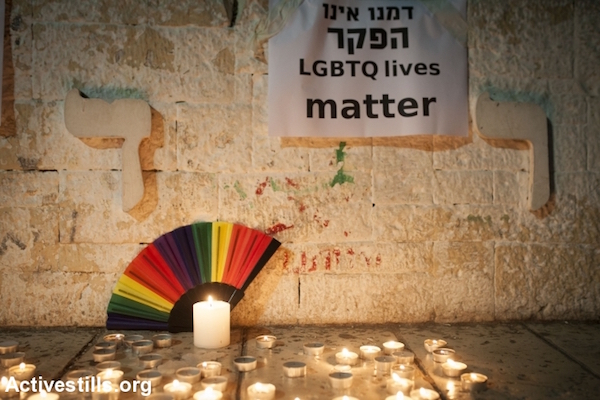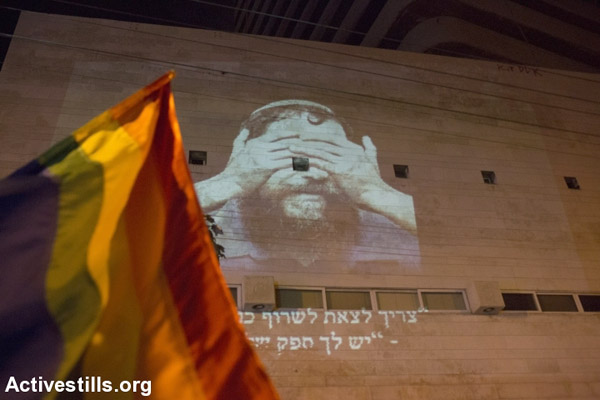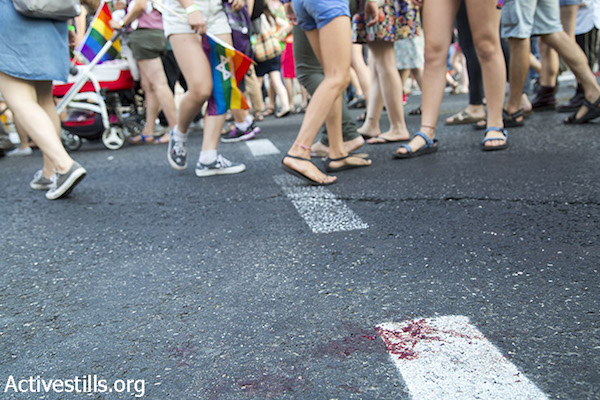‘Sick,’ ‘perverts,’ ‘abomination,’ ‘blasphemers,’ ‘handicapped’: Hate speech against Israel’s LGBTQ community has reached fever pitch this week, and comes as police have detained queer activists and the High Court has capitulated to homophobia.

The last seven days in Israel have been particularly hostile for the country’s LGBTQ community. A steady stream of homophobic slander from nationalist and ultra-Orthodox rabbis has been bookended by two major pride parades facing serious threats and calls for counter-demonstrations.
The sequence of events began with Be’er Sheva’s pride parade, slated to take place Thursday last week. It would have been the southern Israeli city’s first march, in lieu of an annual demonstration and in spite of mayor Ruvik Danilovich’s refusal to fund the event. The police, however, decided to withdraw the permit for the parade’s intended route along the main thoroughfare, citing credible, serious threats to participants and the fact that the march would “deeply hurt religious sentiments.”
Religious members of Be’er Sheva’s council threatened to resign over the parade and the High Court rejected a petition to reinstate the original path for the march. The police detained a number of local LGBTQ activists the day before the parade — apparently largely without cause — and in protest at the court’s capitulation, the event’s organizers canceled the parade in order to stage a protest. Ofer Kardi, the deputy mayor and chair of Be’er Sheva’s Shas movement, expressed his satisfaction that the “extremist” parade would no longer be taking place.
As this was going on, a separate controversy began when Rabbi Yigal Levenstein, the co-head of a prominent pre-military academy in a West Bank settlement, repeatedly referred to LGBTQs as “perverts” while addressing a conference about the impact of Reform Judaism on identity in Israel. (This incident came at the tail-end of another media brawl that erupted when the IDF nominated Rabbi Eyal Karim as the army’s next chief rabbi, a religious figure who in addition to being notorious for egregious comments on rape also referred to LGBTQs as “sick or disabled.”)
It should be noted that Levenstein’s comments earned him condemnation from across the political spectrum as well as from some of his students, who declared their intention to march at this year’s pride parade in Jerusalem. Jewish Home party chairman Naftali Bennett, too, censured Levenstein, saying that one cannot label an entire community and then “hide behind halakha [Jewish religious law],” although he and his party are staunchly opposed to same-sex marriage.

But Levenstein and his views also won broad support from his peers, leading to a week in which homophobic comments have tumbled into the public sphere on a near-daily basis. The chief rabbi of Tel Aviv suburb Ramat Gan, Yaakov Ariel, said that LGBTQs are “handicapped” and “in need of psychological treatment.” Safed Chief Rabbi Shmuel Eliyahu told Army Radio that members of the queer community are “sick, like prostitution and drugs.” Around 300 religious Zionist rabbis signed a petition, published on Wednesday, backing Levenstein and criticizing Bennett.
All this has happened in the run-up to Thursday’s pride parade in Jerusalem. The event has attracted the customary protest and plans for counter-demonstrations from the far-right Jewish purity group Lehava, and Jerusalem’s ultra-Orthodox communities, whose neighborhoods have been dotted with posters calling the parade an “abomination.” Jerusalem’s deputy mayor, Meir Turgeman, told Army Radio on Wednesday that “Jerusalem is a holy city and [the pride participants] are blasphemers.” The chief rabbi of Hebron and Kiryat Arba, Dov Lior, also called the event an “abomination,” while a faction of religious Zionist rabbis has published a letter accusing the parade and its attendees of “desecrating” Jerusalem.
This is the same kind of hate speech that could be heard leading up to to last year’s Jerusalem Pride, at which Yishai Shlissel, an ultra-Orthodox man, stabbed teenager Shira Banki to death and wounded five other people. (Police have issued a restraining order barring members of Shlissel’s family from Jerusalem during this year’s parade, for fear that they may pose a threat to participants. They also arrested Shlissel himself, in prison, for conspiracy to carry out another attack.)

In the face of this incitement, Jerusalem Mayor Nir Barkat declared in an interview with Yedioth Ahronoth that he would not be attending Thursday’s march because he doesn’t want to “harm the ultra-Orthodox and religious-Zionist public.” Barkat could have kept silent on his reasons for not attending the march. Instead, he chose to validate the same homophobic sentiments that the march exists to stand up to.
Incidentally, the official tourism website of the Jerusalem Municipality has an event page for both Jerusalem Pride Week and the march itself, on which it tells potential visitors to “[s]upport LGBT rights, pride and tolerance by walking through the streets of Jerusalem in the Jerusalem March for Pride and Tolerance” — an activity the city’s own mayor seemingly believes is inappropriate.
This last point encapsulates the fundamental contradiction surrounding queer rights in Israel: the facts on the ground paint a vastly different picture from the carefully manicured image of a beacon of LGBTQ tolerance and inclusion that the country projects to the world.
Expensive advertising — NIS 11 million ($2.85 million), to be precise, around 10 times what the government spends on support for LGBTQ rights organizations — cannot hide that homophobia is a real, present and rising threat for Israel’s queer community. A series of reports and studies over the past year have pointed to a surge in homophobic incidents from 2014 to 2015 and disturbingly high rates of sexual harassment and physical violence against LGBTQ women and the transgender community. Even the U.S. Consulate in Jerusalem saw fit to issue a statement urging its citizens to exercise caution at this year’s parade.
Nor can Israel’s gay-friendly branding onslaught, increasingly referred to as “pinkwashing,” mask the fact that one piece of proposed gay rights legislation after another falls at the first hurdle in the Knesset. This alone makes Israeli politicians’ condemnation of homophobia — much as it is to be welcomed — little more than symbolic, for it does nothing to advance the fight for full equality under the law, nor the depressing state of personal security for the LGBTQ community. And this sporadic uproar comes almost solely when Jews are under attack for their sexuality — barely a squeak is to be heard on the IDF’s practice of exploiting West Bank Palestinians’ sexual orientation in order to try and blackmail them into collaborating.

